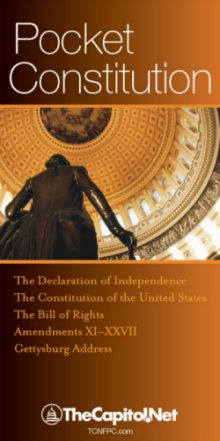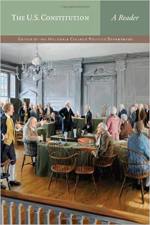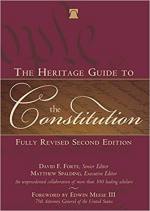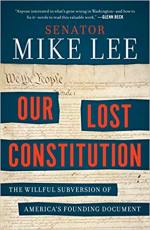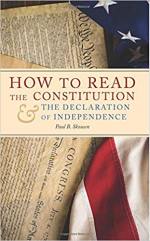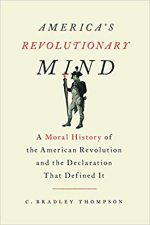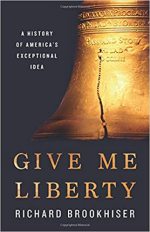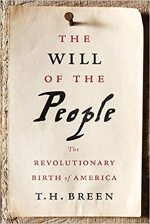The United States Constitution and The Declaration of Independence
Pocket Constitution – Related Materials
TCNCRM.com / TCNCAM.com
If you have suggestions for additional Constitution-related items that should be referenced, please contact us.
Thanks to the people who have made suggestions: Prof. W. B. Allen, Prof. Robert McDonald, Toby Dorsey.
Antonin Scalia – On American Exceptionalism
- The Theory of Moral Sentiments, by Adam Smith (1759)
- From Founders Online – National Archives:
- – –IV. A Proclamation by the General Court, 19 January 1776
- – –George Washington’s Farewell Address, September 19, 1796
- – –Letter From Thomas Jefferson to Roger Chew Weightman, 24 June 1826
- The Federalist Papers (via The Avalon Project at Yale Law School):
- – –No. 10, The Union as a Safeguard Against Domestic Faction and Insurrection From the New York Packet. Friday, November 23, 1787.
- – –No. 51, The Structure of the Government Must Furnish the Proper Checks and Balances Between the Different Departments. From the New York Packet. Friday, February 8, 1788.
- – –No. 57, The Alleged Tendency of the New Plan to Elevate the Few at the Expense of the Many Considered in Connection with Representation. From the New York Packet. Tuesday, February 19, 1788.
- – –No. 81, The Judiciary Continued, and the Distribution of the Judicial Authority. From McLEAN’s Edition, New York.
- The Most-Cited Federalist Papers, by Ira C. Lupu, 1998 (opens in new window)
- Memorial and Remonstrance against Religious Assessments, by James Madison, 1785
- Vices of the Political System of the United States, by James Madison, May 7, 1787
- Northwest Ordinance of 1787
- “Second Inaugural Address,” by Abraham Lincoln, March 4, 1865
- “I have a Dream,” by Martin Luther King, Jr., August 28, 1963
- More Articles and Books
- Also see our Congressional Glossary
The Theory of Moral Sentiments, by Adam Smith (1759)
The man of system, on the contrary, is apt to be very wise in his own conceit; and is often so enamoured with the supposed beauty of his own ideal plan of government, that he cannot suffer the smallest deviation from any part of it. He goes on to establish it completely and in all its parts, without any regard either to the great interests, or to the strong prejudices which may oppose it. He seems to imagine that he can arrange the different members of a great society with as much ease as the hand arranges the different pieces upon a chess-board. He does not consider that the pieces upon the chess-board have no other principle of motion besides that which the hand impresses upon them; but that, in the great chess-board of human society, every single piece has a principle of motion of its own, altogether different from that which the legislature might chuse to impress upon it. If those two principles coincide and act in the same direction, the game of human society will go on easily and harmoniously, and is very likely to be happy and successful. If they are opposite or different, the game will go on miserably, and the society must be at all times in the highest degree of disorder.
Source: The Men and Women of the Moral System: Adam Smith on Sobriety, by Art Carden
Adam Smith, Theory of Moral Sentiments
Back to top
IV. A Proclamation by the General Court, 19 January 1776
(A Proclamation by the General Court, Massachusetts, January 19, 1776)
As the Happiness of the People, is the sole End of Government, So the Consent of the People is the only Foundation of it, in Reason, Morality, and the natural Fitness of things: and therefore every Act of Government, every Exercise of Sovereignty, against, or without, the Consent of the People, is Injustice, Usurpation, and Tyranny.
It is a Maxim, that in every Government, there must exist Somewhere, a Supreme, Sovereign, absolute, and uncontroulable Power: But this power resides always in the Body of the People, and it never was, or can be delegated, to one Man, or a few, the great Creator having never given to Men a right to vest others with Authority over them, unlimited either in Duration or Degree.
John Adams: A Closer Look (HBO)
Source: Founders Online (footnotes omitted)
Back to top
George Washington’s Farewell Address, September 19, 1796
The acceptance of, and continuance hitherto in the office to which your suffrages have twice called me; have been a uniform sacrifice of inclination to the opinion of duty, and to a deference for what appeared to be your desire. I constantly hoped, that it would have been much earlier in my power, consistently with motives, which I was not at liberty to disregard, to return to that retirement, from which I had been reluctantly drawn. The strength of my inclination to do this, previous to the last election, had even led to the preparation of an address to declare it to you; but mature reflection on the then perplexed and critical posture of our affairs with foreign nations, and the unanimous advice of persons entitled to my confidence, impelled me to abandon the idea.
I rejoice, that the state of your concerns, external as well as internal, no longer renders the pursuit of inclination incompatible with the sentiment of duty, or propriety; and am persuaded whatever partiality may be retained for my services, that in the present circumstances of our country, you will not disapprove my determination to retire.
Ben Sasse Delivers the 125th Reading of Washington’s Farewell Address
While then every part of our country thus feels an immediate and particular interest in Union, all the parts combined cannot fail to find in the united mass of means and efforts greater strength, greater resource, proportionably greater security from external danger, a less frequent interruption of their peace by foreign nations;—and what is of inestimable value! they must derive from Union an exemption from those broils and wars between themselves, which so frequently afflict neighbouring countries, not tied together by the same government; which their own rivalships alone would be sufficient to produce, but which opposite foreign alliances, attachments and intrigues would stimulate and imbitter.—Hence likewise they will avoid the necessity of those overgrown military establishments, which under any form of government are inauspicious to liberty, and which are to be regarded as particularly hostile to Republican Liberty; In this sense it is, that your Union ought to be considered as a main prop of your liberty, and that the love of the one ought to endear to you the preservation of the other.
. . .
In contemplating the causes which may disturb our Union, it occurs as matter of serious concern, that any ground should have been furnished for characterising parties by Geographical discriminations—Northern and Southern—Atlantic and Western; whence designing men may endeavour to excite a belief that there is a real difference of local interests and views. One of the expedients of party to acquire influence, within particular districts, is to misrepresent the opinions and aims of other districts. You cannot shield yourselves too much against the jealousies and heart burnings which spring from these misrepresentations: they tend to render alien to each other those who ought to be bound together by fraternal affection.
. . .
The basis of our political systems is the right of the people to make and to alter their Constitutions of Government—But, the Constitution which at any time exists, ’till changed by an explicit and authentic act of the whole people, is sacredly obligatory upon all.
. . .
All obstructions to the execution of the Laws, all combinations and associations, under whatever plausible character, with the real design to direct, controul, counteract, or awe the regular deliberation and action of the constituted authorities, are destructive of this fundamental principle, and of fatal tendency. They serve to organize faction, to give it an artificial and extraordinary force—to put in the place of the delegated will of the nation, the will of a party, often a small but artful and enterprizing minority of the community; and, according to the alternate triumphs of different parties, to make the public administration the mirror of the ill concerted and incongruous projects of faction, rather than the organ of consistent and wholesome plans digested by common councils, and modified by mutual interests.
However combinations or associations of the above description may now and then answer popular ends, they are likely in the course of time and things, to become potent engines, by which cunning, ambitious and unprincipled men will be enabled to subvert the power of the people, and to usurp for themselves the reigns of government; destroying afterwards the very engines which have lifted them to unjust dominion.
Towards the preservation of your government, and the permanency of your present happy state, it is requisite, not only that you steadily discountenance irregular oppositions to its acknowledged authority, but also that you resist with care the spirit of innovation upon its principles however specious the pretexts.—One method of assault may be to effect in the forms of the constitution alterations which will impair the energy of the system, and thus to undermine what cannot be directly overthrown.
Senator Tim Kaine Washington’s Farewell Address
I have already intimated to you, the danger of parties in the state, with particular reference to the founding of them on geographical discriminations. Let me now take a more comprehensive view, and warn you in the most solemn manner against the baneful effects of the spirit of party, generally.
This spirit, unfortunately, is inseparable from our nature, having its root in the strongest passions of the human mind.—It exists under different shapes in all governments, more of less stifled, controuled, or repressed; but in those of the popular form, it is seen in its greatest rankness and is truly their worst enemy.
The alternate domination of one faction over another; sharpened by the spirit of revenge, natural to party dissention; which in different ages and countries has perpetrated the most horrid enormities, is itself a frightful despotism.—But this leads at length to a more formal and permanent despotism.—The disorders and miseries, which result, gradually incline the minds of men to seek security and repose in the absolute power of an individual: and sooner or later the chief of some prevailing faction more able or more fortunate than his competitors, turns this disposition to the purposes of his own elevation, on the ruins of Public Liberty.
Without looking forward to the extremity of this kind (which nevertheless ought not to be entirely out of sight) the common and continual mischiefs of the spirit of party are sufficient to make it the interest and duty of a wise People to discourage and restrain it.
It serves always to distract the Public Councils and enfeeble the Public Administration. It agitates the Community with ill founded jealousies and false alarms; kindles the animosity of one part against another, foments occasionally riot and insurrection. It opens the door to foreign influence and corruption, which find a facilitated access to the government itself through the channels of party passions. Thus the policy and the will of one country are subjected to the policy and will of another.
There is an opinion that parties in free countries are useful checks upon the administration of the Government, and serve to keep alive the spirit of Liberty. This within certain limits is probably true; and in Governments of a Monarchial cast, Patriotism may look with indulgence, if not with favour upon the spirit of party. But in those of the popular character, in Governments purely elective, it is a spirit not to be encouraged. From their natural tendency, it is certain there will always be enough of that spirit for every salutary purpose. And there being constant danger of excess, the effort ought to be, by force of public opinion, to mitigate and assuage it. A fire not to be quenched; it demands a uniform vigilance to prevent its bursting into a flame, lest, instead of warming it should consume.
John Avlon and Washington’s Warning to Future Generations (HD)
It is important likewise, that the habits of thinking in a free country, should inspire caution, in those entrusted with its administration, to confine themselves within their respective constitutional spheres, avoiding in the exercise of the powers of one department to encroach upon another. The spirit of encroachment tends to consolidate the powers of all the departments in one, and thus to create, whatever the form of government, a real despotism. A just estimate of that love of power, and proneness to abuse it, which predominates in the human heart, is sufficient to satisfy us of the truth of this position. The necessity of reciprocal checks in the exercise of political power; by dividing and distributing it into different depositories, and constituting each the Guardian of the Public Weal against invasions by the others, has been evinced by experiments ancient and modern: some of them in our country and under our own eyes. To preserve them must be as necessary as to institute them. If, in the opinion of the People, the distribution or modification of the constitutional powers be in any particular wrong, let it be corrected by an amendment in the way which the constitution designates.
. . .
Of all the dispositions and habits which lead to political prosperity, Religion and Morality are indispensable supports.—In vain would that man claim the tribute of Patriotism, who should labour to subvert these great pillars of human happiness, these firmest props of the duties of Men and Citizens.—The mere Politician, equally with the pious man ought to respect and to cherish them.—A volume could not trace all their connections with private and public felicity. Let it simply be asked where is the security for property, for reputation, for life, if the sense of religious obligation desert the oaths, which are the instruments of investigation in Courts of Justice? And let us with caution indulge the supposition, that morality can be maintained without religion. Whatever may be conceded to the influence of refined education on minds of peculiar structure; reason and experience both forbid us to expect that national morality can prevail in exclusion of religious principle.
’Tis substantially true, that virtue or morality is a necessary spring of popular government. The rule indeed extends with more or less force to every species of free government. Who that is a sincere friend to it can look with indifference upon attempts to shake the foundation of the fabric?
George Washington Farewell Address 05 – Religion, Morality, Virtue – Keys to Freedom
As a very important source of strength and security cherish public credit. One method of preserving it is to use it as sparingly as possible; avoiding occasions of expence by cultivating peace, but remembering also that timely disbursements to prepare for danger frequently prevent much greater disbursements to repel it; avoiding likewise the accumulation of debt, not only by shunning occasions of expence, but by vigorous exertions in time of peace to discharge the debts which unavoidable wars may have occasioned, not ungenerously throwing upon posterity the burthen which we ourselves ought to bear.
[N]othing is more essential than that permanent, inveterate antipathies against particular Nations, and passionate attachments for others should be excluded; and that in place of them just and amicable feelings towards all should be cultivated. The Nation, which indulges towards another an habitual hatred, or an habitual fondness, is in some degree a slave. It is a slave to its animosity or to its affection, either of which is sufficient to lead it astray from its duty and its interest. Antipathy in one nation against another disposes each more readily to offer insult and injury, to lay hold of slight causes of umbrage, and to be haughty and intractable, when accidental or trifling occasions of dispute occur. Hence frequent collisions, obstinate, envenomed and bloody contests. The Nation, prompted by ill will and resentment, sometimes impels to war the Government, contrary to the best calculations of policy. The Government sometimes participates in the national propensity, and adopts through passion what reason would reject; at other times, it makes the animosity of the nation subservient to projects of hostility instigated by pride, ambition and other sinister and pernicious motives. The peace often, sometimes perhaps the liberty, of Nations has been the victim.
. . .
Against the insidious wiles of foreign influence (I conjure you to believe me, fellow-citizens) the jealousy of a free people ought to be constantly awake; since history and experience prove that foreign influence is one of the most baneful foes of Republican Government. But that jealousy to be useful must be impartial; else it becomes the instrument of the very influence to be avoided, instead of a defence against it.—Excessive partiality for one foreign nation, and excessive dislike for another, cause those whom they actuate to see danger only on one side, and serve to veil and even second the arts of influence of the other.—Real patriots, who may resist the intrigues of the favourite, are liable to become suspected and odious; while its tools and dupes usurp the applause and confidence of the people, to surrender their interests.
The great rule of conduct for us, in regard to foreign nations, is in extending our commercial relations, to have with them as little political connection as possible.
George Washington’s Farewell Warning
Source: Founders Online
“George Washington’s Warning on Disunity: We can still learn a lot from Washington’s Farewell Address,” by Richard Lim, FEE, September 20, 2018
Letter From Thomas Jefferson to Roger Chew Weightman, 24 June 1826
[T]he general spread of the light of science has already laid open to every view the palpable truth that the mass of mankind has not been born, with saddles on their backs, nor a favored few booted and spurred, ready to ride them legitimately, by the grace of god.
Source: Founders Online
“Jefferson’s powerful last public letter reminds us what Independence Day is all about,” by Gregory S. Schneider, The Washington Post, July 3, 2017
The Federalist Papers, No. 10, The Union as a Safeguard Against Domestic Faction and Insurrection From the New York Packet. Friday, November 23, 1787. (James Madison)
Liberty is to faction what air is to fire, an aliment without which it instantly expires. But it could not be less folly to abolish liberty, which is essential to political life, because it nourishes faction, than it would be to wish the annihilation of air, which is essential to animal life, because it imparts to fire its destructive agency.
Federalist Papers #10 (part 1)
But the most common and durable source of factions has been the various and unequal distribution of property. Those who hold and those who are without property have ever formed distinct interests in society. Those who are creditors, and those who are debtors, fall under a like discrimination. A landed interest, a manufacturing interest, a mercantile interest, a moneyed interest, with many lesser interests, grow up of necessity in civilized nations, and divide them into different classes, actuated by different sentiments and views. The regulation of these various and interfering interests forms the principal task of modern legislation, and involves the spirit of party and faction in the necessary and ordinary operations of the government.
. . .
The apportionment of taxes on the various descriptions of property is an act which seems to require the most exact impartiality; yet there is, perhaps, no legislative act in which greater opportunity and temptation are given to a predominant party to trample on the rules of justice. Every shilling with which they overburden the inferior number, is a shilling saved to their own pockets.
. . .
[A] pure democracy, by which I mean a society consisting of a small number of citizens, who assemble and administer the government in person, can admit of no cure for the mischiefs of faction. A common passion or interest will, in almost every case, be felt by a majority of the whole; a communication and concert result from the form of government itself; and there is nothing to check the inducements to sacrifice the weaker party or an obnoxious individual. Hence it is that such democracies have ever been spectacles of turbulence and contention; have ever been found incompatible with personal security or the rights of property; and have in general been as short in their lives as they have been violent in their deaths. Theoretic politicians, who have patronized this species of government, have erroneously supposed that by reducing mankind to a perfect equality in their political rights, they would, at the same time, be perfectly equalized and assimilated in their possessions, their opinions, and their passions.
. . .
The smaller the society, the fewer probably will be the distinct parties and interests composing it; the fewer the distinct parties and interests, the more frequently will a majority be found of the same party; and the smaller the number of individuals composing a majority, and the smaller the compass within which they are placed, the more easily will they concert and execute their plans of oppression. Extend the sphere, and you take in a greater variety of parties and interests; you make it less probable that a majority of the whole will have a common motive to invade the rights of other citizens; or if such a common motive exists, it will be more difficult for all who feel it to discover their own strength, and to act in unison with each other.
Federalist Papers #10 (part 2)
Source: Avalon Project, LII
The Federalist Papers, No. 51, The Structure of the Government Must Furnish the Proper Checks and Balances Between the Different Departments From the New York Packet. Friday, February 8, 1788. (James Madison)
Ambition must be made to counteract ambition. The interest of the man must be connected with the constitutional rights of the place. It may be a reflection on human nature, that such devices should be necessary to control the abuses of government. But what is government itself, but the greatest of all reflections on human nature? If men were angels, no government would be necessary. If angels were to govern men, neither external nor internal controls on government would be necessary. In framing a government which is to be administered by men over men, the great difficulty lies in this: you must first enable the government to control the governed; and in the next place oblige it to control itself.
A dependence on the people is, no doubt, the primary control on the government; but experience has taught mankind the necessity of auxiliary precautions. This policy of supplying, by opposite and rival interests, the defect of better motives, might be traced through the whole system of human affairs, private as well as public. We see it particularly displayed in all the subordinate distributions of power, where the constant aim is to divide and arrange the several offices in such a manner as that each may be a check on the other that the private interest of every individual may be a sentinel over the public rights. These inventions of prudence cannot be less requisite in the distribution of the supreme powers of the State. But it is not possible to give to each department an equal power of self-defense. In republican government, the legislative authority necessarily predominates. The remedy for this inconveniency is to divide the legislature into different branches; and to render them, by different modes of election and different principles of action, as little connected with each other as the nature of their common functions and their common dependence on the society will admit. It may even be necessary to guard against dangerous encroachments by still further precautions.
Exploring Federalist 51: Separation of Powers
In the compound republic of America, the power surrendered by the people is first divided between two distinct governments, and then the portion allotted to each subdivided among distinct and separate departments. Hence a double security arises to the rights of the people. The different governments will control each other, at the same time that each will be controlled by itself. Second. It is of great importance in a republic not only to guard the society against the oppression of its rulers, but to guard one part of the society against the injustice of the other part. Different interests necessarily exist in different classes of citizens. If a majority be united by a common interest, the rights of the minority will be insecure.
Separation of Powers and Checks and Balances
In a society under the forms of which the stronger faction can readily unite and oppress the weaker, anarchy may as truly be said to reign as in a state of nature, where the weaker individual is not secured against the violence of the stronger; and as, in the latter state, even the stronger individuals are prompted, by the uncertainty of their condition, to submit to a government which may protect the weak as well as themselves; so, in the former state, will the more powerful factions or parties be gradually induced, by a like motive, to wish for a government which will protect all parties, the weaker as well as the more powerful.
Source: Avalon Project (LII)
Back to top
The Federalist Papers, No. 57, The Alleged Tendency of the New Plan to Elevate the Few at the Expense of the Many Considered in Connection with Representation. From the New York Packet. Tuesday, February 19, 1788. (James Madison or Alexander Hamilton)
The aim of every political constitution is, or ought to be, first to obtain for rulers men who possess most wisdom to discern, and most virtue to pursue, the common good of the society; and in the next place, to take the most effectual precautions for keeping them virtuous whilst they continue to hold their public trust. The elective mode of obtaining rulers is the characteristic policy of republican government. The means relied on in this form of government for preventing their degeneracy are numerous and various. The most effectual one, is such a limitation of the term of appointments as will maintain a proper responsibility to the people.
Let me now ask what circumstance there is in the constitution of the House of Representatives that violates the principles of republican government, or favors the elevation of the few on the ruins of the many? Let me ask whether every circumstance is not, on the contrary, strictly conformable to these principles, and scrupulously impartial to the rights and pretensions of every class and description of citizens? Who are to be the electors of the federal representatives? Not the rich, more than the poor; not the learned, more than the ignorant; not the haughty heirs of distinguished names, more than the humble sons of obscurity and unpropitious fortune. The electors are to be the great body of the people of the United States. They are to be the same who exercise the right in every State of electing the corresponding branch of the legislature of the State. Who are to be the objects of popular choice? Every citizen whose merit may recommend him to the esteem and confidence of his country. No qualification of wealth, of birth, of religious faith, or of civil profession is permitted to fetter the judgement or disappoint the inclination of the people.
. . .
Ingratitude is a common topic of declamation against human nature; and it must be confessed that instances of it are but too frequent and flagrant, both in public and in private life. But the universal and extreme indignation which it inspires is itself a proof of the energy and prevalence of the contrary sentiment.
In the third place, those ties which bind the representative to his constituents are strengthened by motives of a more selfish nature. His pride and vanity attach him to a form of government which favors his pretensions and gives him a share in its honors and distinctions. Whatever hopes or projects might be entertained by a few aspiring characters, it must generally happen that a great proportion of the men deriving their advancement from their influence with the people, would have more to hope from a preservation of the favor, than from innovations in the government subversive of the authority of the people. All these securities, however, would be found very insufficient without the restraint of frequent elections.
Source: Avalon Project (LII)
Back to top
The Federalist Papers, No. 81, The Judiciary Continued, and the Distribution of the Judicial Authority From McLEAN’s Edition, New York. (Alexander Hamilton)
[T]he Constitution ought to be the standard of construction for the laws, and that wherever there is an evident opposition, the laws ought to give place to the Constitution. But this doctrine is not deducible from any circumstance peculiar to the plan of the convention, but from the general theory of a limited Constitution; and as far as it is true, is equally applicable to most, if not to all the State governments.
Source: Avalon Project (LII)
Rules Versus Standards in Constitutional and Statutory Interpretation [Showcase Panel II]
Back to top
Memorial and Remonstrance against Religious Assessments, by James Madison, 1785
The Religion then of every man must be left to the conviction and conscience of every man; and it is the right of every man to exercise it as these may dictate. This right is in its nature an unalienable right. It is unalienable, because the opinions of men, depending only on the evidence contemplated by their own minds cannot follow the dictates of other men: It is unalienable also, because what is here a right towards men, is a duty towards the Creator. It is the duty of every man to render to the Creator such homage and such only as he believes to be acceptable to him. This duty is precedent, both in order of time and in degree of obligation, to the claims of Civil Society. Before any man can be considered as a member of Civil Society, he must be considered as a subject of the Governour of the Universe: And if a member of Civil Society, who enters into any subordinate Association, must always do it with a reservation of his duty to the General Authority; much more must every man who becomes a member of any particular Civil Society, do it with a saving of his allegiance to the Universal Sovereign. We maintain therefore that in matters of Religion, no mans right is abridged by the institution of Civil Society and that Religion is wholly exempt from its cognizance. True it is, that no other rule exists, by which any question which may divide a Society, can be ultimately determined, but the will of the majority; but it is also true that the majority may trespass on the rights of the minority.
James Madison and American Democracy, by Professor William Allen
During almost fifteen centuries has the legal establishment of Christianity been on trial. What have been its fruits? More or less in all places, pride and indolence in the Clergy, ignorance and servility in the laity, in both, superstition, bigotry and persecution. Enquire of the Teachers of Christianity for the ages in which it appeared in its greatest lustre; those of every sect, point to the ages prior to its incorporation with Civil policy.
Source: James Madison, “Memorial and Remonstrance against Religious Assessments,” 1785 (Founders Online, National Archives)
“James Madison: Architect of the Separation of Church and State,” by Jon Miltimore, FEE, July 29, 2019
Back to top
Vices of the Political System of the United States, by James Madison, May 7, 1787
Representative appointments are sought from 3 motives. 1. ambition 2. personal interest. 3. public good. Unhappily the two first are proved by experience to be most prevalent. Hence the candidates who feel them, particularly, the second, are most industrious, and most successful in pursuing their object: and forming often a majority in the legislative Councils, with interested views, contrary to the interest, and views, of their Constituents, join in a perfidious sacrifice of the latter to the former.
Source: James Madison, “Vices of the Political System of the United States,” May 7, 1787 (Library of Congress)
“One Problem with Big Government: Often Run by Crooks and Liars,’ by Chris Edwards, Cato at Liberty, May 7, 2019
Back to top
Northwest Ordinance of 1787
Art. 1. No person, demeaning himself in a peaceable and orderly manner, shall ever be molested on account of his mode of worship or religious sentiments, in the said territory.
Art. 2. The inhabitants of the said territory shall always be entitled to the benefits of the writ of habeas corpus, and of the trial by jury; of a proportionate representation of the people in the legislature; and of judicial proceedings according to the course of the common law. All persons shall be bailable, unless for capital offenses, where the proof shall be evident or the presumption great. All fines shall be moderate; and no cruel or unusual punishments shall be inflicted. No man shall be deprived of his liberty or property, but by the judgment of his peers or the law of the land; and, should the public exigencies make it necessary, for the common preservation, to take any person’s property, or to demand his particular services, full compensation shall be made for the same. And, in the just preservation of rights and property, it is understood and declared, that no law ought ever to be made, or have force in the said territory, that shall, in any manner whatever, interfere with or affect private contracts or engagements, bona fide, and without fraud, previously formed.
Art. 3. Religion, morality, and knowledge, being necessary to good government and the happiness of mankind, schools and the means of education shall forever be encouraged. The utmost good faith shall always be observed towards the Indians; their lands and property shall never be taken from them without their consent; and, in their property, rights, and liberty, they shall never be invaded or disturbed, unless in just and lawful wars authorized by Congress; but laws founded in justice and humanity, shall from time to time be made for preventing wrongs being done to them, and for preserving peace and friendship with them.
. . .
Art. 6. There shall be neither slavery nor involuntary servitude in the said territory, otherwise than in the punishment of crimes whereof the party shall have been duly convicted: Provided, always, That any person escaping into the same, from whom labor or service is lawfully claimed in any one of the original States, such fugitive may be lawfully reclaimed and conveyed to the person claiming his or her labor or service as aforesaid.
Source: Northwest Ordinance; July 13, 1787 (Avalon Project)
Northwest Ordinance 1787
Back to top
“Second Inaugural Address,” by Abraham Lincoln, March 4, 1865
Fellow-Countrymen:
At this second appearing to take the oath of the Presidential office there is less occasion for an extended address than there was at the first. Then a statement somewhat in detail of a course to be pursued seemed fitting and proper. Now, at the expiration of four years, during which public declarations have been constantly called forth on every point and phase of this great conflict which is of primary concern to the nation as a whole, little that is new could be presented. The progress of our arms, upon which all else chiefly depends, is as well known to the public as to myself, and it is, I trust, reasonably satisfactory and encouraging to all. With high hope for the future, no prediction in regard to it is ventured.
On the occasion corresponding to this four years ago all thoughts were anxiously directed to an impending civil war. All dreaded it, all sought to avert it. While the inaugural address was being delivered from this place, devoted altogether to saving the Union without war, insurgent agents were in the city seeking to destroy it without war—seeking to dissolve the Union and divide effects by negotiation. Both parties deprecated war, but one of them would make war rather than let the nation survive, and the other would accept war rather than let it perish. And the war came.
One-eighth of the whole population were colored slaves, not distributed generally over the Union, but localized in the southern part of it. These slaves constituted a peculiar and powerful interest. All knew that this interest was somehow the cause of the war. To strengthen, perpetuate, and extend this interest was the object for which the insurgents would rend the Union even by war, while the Government claimed no right to do more than to restrict the territorial enlargement of it. Neither party expected for the war the magnitude or the duration which it has already attained. Neither anticipated that the cause of the conflict might cease with or even before the conflict itself should cease. Each looked for an easier triumph, and a result less fundamental and astounding. Both read the same Bible and pray to the same God, and each invokes His aid against the other. It may seem strange that any men should dare to ask a just God’s assistance in wringing their bread from the sweat of other men’s faces, but let us judge not, that we be not judged. The prayers of both could not be answered. That of neither has been answered fully. The Almighty has His own purposes. “Woe unto the world because of offenses; for it must needs be that offenses come, but woe to that man by whom the offense cometh.” If we shall suppose that American slavery is one of those offenses which, in the providence of God, must needs come, but which, having continued through His appointed time, He now wills to remove, and that He gives to both North and South this terrible war as the woe due to those by whom the offense came, shall we discern therein any departure from those divine attributes which the believers in a living God always ascribe to Him? Fondly do we hope, fervently do we pray, that this mighty scourge of war may speedily pass away. Yet, if God wills that it continue until all the wealth piled by the bondsman’s two hundred and fifty years of unrequited toil shall be sunk, and until every drop of blood drawn with the lash shall be paid by another drawn with the sword, as was said three thousand years ago, so still it must be said “the judgments of the Lord are true and righteous altogether.”
With malice toward none, with charity for all, with firmness in the right as God gives us to see the right, let us strive on to finish the work we are in, to bind up the nation’s wounds, to care for him who shall have borne the battle and for his widow and his orphan, to do all which may achieve and cherish a just and lasting peace among ourselves and with all nations.
“I have a Dream,” by Martin Luther King, Jr., August 28, 1963
I Have a Dream speech by Martin Luther King .Jr HD (subtitled) (Remastered)
Delivered on the steps at the Lincoln Memorial in Washington DC on August 28, 1963
Five score years ago, a great American, in whose symbolic shadow we stand signed the Emancipation Proclamation. This momentous decree came as a great beacon light of hope to millions of Negro slaves who had been seared in the flames of withering injustice. It came as a joyous daybreak to end the long night of captivity.
But one hundred years later, we must face the tragic fact that the Negro is still not free. One hundred years later, the life of the Negro is still sadly crippled by the manacles of segregation and the chains of discrimination. One hundred years later, the Negro lives on a lonely island of poverty in the midst of a vast ocean of material prosperity. One hundred years later, the Negro is still languishing in the corners of American society and finds himself an exile in his own land. So we have come here today to dramatize an appalling condition.
In a sense we have come to our nation’s capital to cash a check. When the architects of our republic wrote the magnificent words of the Constitution and the declaration of Independence, they were signing a promissory note to which every American was to fall heir. This note was a promise that all men would be guaranteed the inalienable rights of life, liberty, and the pursuit of happiness.
It is obvious today that America has defaulted on this promissory note insofar as her citizens of color are concerned. Instead of honoring this sacred obligation, America has given the Negro people a bad check which has come back marked “insufficient funds.” But we refuse to believe that the bank of justice is bankrupt. We refuse to believe that there are insufficient funds in the great vaults of opportunity of this nation. So we have come to cash this check — a check that will give us upon demand the riches of freedom and the security of justice. We have also come to this hallowed spot to remind America of the fierce urgency of now. This is no time to engage in the luxury of cooling off or to take the tranquilizing drug of gradualism. Now is the time to rise from the dark and desolate valley of segregation to the sunlit path of racial justice. Now is the time to open the doors of opportunity to all of God’s children. Now is the time to lift our nation from the quicksands of racial injustice to the solid rock of brotherhood.
It would be fatal for the nation to overlook the urgency of the moment and to underestimate the determination of the Negro. This sweltering summer of the Negro’s legitimate discontent will not pass until there is an invigorating autumn of freedom and equality. Nineteen sixty-three is not an end, but a beginning. Those who hope that the Negro needed to blow off steam and will now be content will have a rude awakening if the nation returns to business as usual. There will be neither rest nor tranquility in America until the Negro is granted his citizenship rights. The whirlwinds of revolt will continue to shake the foundations of our nation until the bright day of justice emerges.
But there is something that I must say to my people who stand on the warm threshold which leads into the palace of justice. In the process of gaining our rightful place we must not be guilty of wrongful deeds. Let us not seek to satisfy our thirst for freedom by drinking from the cup of bitterness and hatred.
We must forever conduct our struggle on the high plane of dignity and discipline. We must not allow our creative protest to degenerate into physical violence. Again and again we must rise to the majestic heights of meeting physical force with soul force. The marvelous new militancy which has engulfed the Negro community must not lead us to distrust of all white people, for many of our white brothers, as evidenced by their presence here today, have come to realize that their destiny is tied up with our destiny and their freedom is inextricably bound to our freedom. We cannot walk alone.
. . .
When we let freedom ring, when we let it ring from every village and every hamlet, from every state and every city, we will be able to speed up that day when all of God’s children, black men and white men, Jews and Gentiles, Protestants and Catholics, will be able to join hands and sing in the words of the old Negro spiritual, “Free at last! free at last! Thank God Almighty, we are free at last!”
Full Text of Speech (Avalon Project)
More Articles and Books
- “Commentary: Making Law Professors and Law Students Great Again,” by Stephen B. Presser, The Tennessee Star, October 13, 2018

John Adams (HBO) DVD

Sons Of Liberty DVD

George Washington – The Complete Miniseries DVD

Liberty! The American Revolution DVD
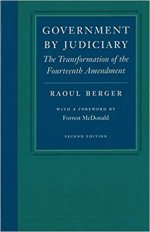
Government by Judiciary: The Transformation of the Fourteenth Amendment
(Free Online)
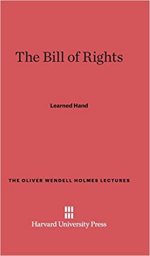
The Bill of Rights – Oliver Wendell Holmes Lectures
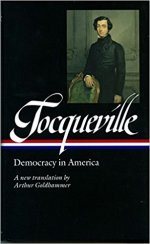
Alexis de Tocqueville: Democracy in America
(Free Online)
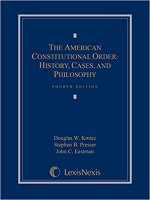
The American Constitutional Order: History, Cases, and Philosophy
Courses
- Congressional Operations Briefing – Capitol Hill Workshop
- Drafting Federal Legislation and Amendments
- Writing for Government and Business: Critical Thinking and Writing
- Custom Training
- Drafting Effective Federal Legislation and Amendments in a Nutshell, Audio Course on CD
- Congress, the Legislative Process, and the Fundamentals of Lawmaking Series, a Nine-Course series on CD
Publications
CongressionalGlossary.com, from TheCapitol.Net
For more than 40 years, TheCapitol.Net and its predecessor, Congressional Quarterly Executive Conferences, have been teaching professionals from government, military, business, and NGOs about the dynamics and operations of the legislative and executive branches and how to work with them.
Our custom on-site and online training, publications, and audio courses include congressional operations, legislative and budget process, communication and advocacy, media and public relations, testifying before Congress, research skills, legislative drafting, critical thinking and writing, and more.
TheCapitol.Net is on the GSA Schedule, MAS, for custom on-site and online training. GSA Contract GS02F0192X
TheCapitol.Net is now owned by the Sunwater Institute.
Teaching how Washington and Congress work ™

